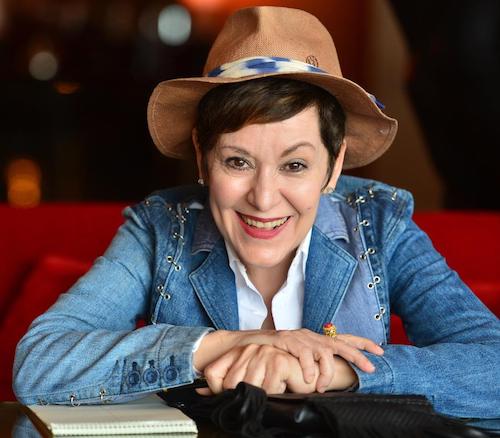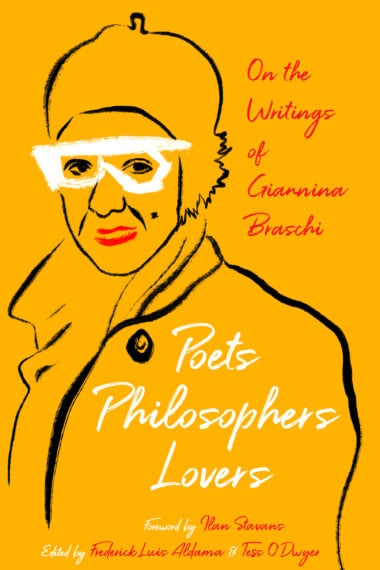Giannina Braschi in the World of Contemporary Latinx Literature
By Frederick Luis Aldama | On February 9, 2021 | Updated August 29, 2022 | Comments (0)

This introduction to Latinx literary figure Giannina Braschi is excerpted from Poets, Philosophers, Lovers: On the Writings of Giannina Braschi, edited by by Frederick Luis Aldama and Tess O’Dwyer. © 2020 University of Pittsburgh Press. All rights reserved, reprinted by permission.
Scholar, playwright, spoken-word performer, award-winning poet, and avant-garde fiction author, since the 1980s Giannina Braschi has been creating up a storm in and around a panoply of Latinx hemispheric spaces.
Her creative corpus reaches across different genres, regions, and historical epochs. Her critical works cover a wide range of subjects and authors, including Miguel de Cervantes, Garcilaso de la Vega, Juan Ramón Jiménez, Gustavo Adolfo Bécquer, Antonio Machado, César Vallejo, and García Lorca.
. . . . . . . . . .

Giannina Braschi
. . . . . . . . . .
Braschi’s dramatic poetry titles in Spanish include Asalto al tiempo (1981) and La comedia profana (1985). Her radically experimental genre-bending titles include El imperio de los sueños (1988), the bilingual Yo-Yo Boing! (1998), and the English-penned United States of Banana (2011).
With national and international awards and works appearing in Swedish, Slovenian, Russian, and Italian, she is recognized as one of today’s foremost experimental Latinx authors.
Her vibrant bilingually shaped creative expressions and innovation spring from her Latinidad, her Puerto Rican-ness that weaves in and through a planetary aesthetic sensibility.
We discover as much in her work about US/Puerto Rico sociopolitical histories as we encounter the metaphysical and existential explorations of a Cervantes, Rabelais, Diderot, Artaud, Joyce, Beckett, Stein, Borges, Cortázar, and Rosario Castellanos, for instance.
With every flourish of her pen Braschi reminds us that in the distillation and reconstruction of the building blocks of the universe there are no limits to what fiction can do.
And, here too, the black scratches that form words and carefully composed blank spaces shape an absent world; her strict selection out of words and syntax is as important as the precise insertion of words and syntax to put us into the shoes of the “complicit reader” (Julio Cortázar’s term) to most productively interface, invest, and fill in the gaps of her storyworlds.
. . . . . . . . . .

Poets Philosophers Lovers is available wherever books are sold
. . . . . . . . . .
Braschi reminds us of the power of lexis—asking us to deep-dive into the metaphorical, subtextual, and allegorical layers of meaning. No subject remains untouched in her fiction making. She draws from Latinx realities as well as metaphysics— even historical archive, sociopolitical, and judicial discourses.
Indeed, Braschi invents new forms to express polyvalent Latinx sensibilities that shape-shift across time, place, and identity categories.
In many ways, as a contemporary Latinx author Braschi stands apart. Her radically experimental works continue to grow a genealogy of Latinx letters, but they do so from the avant-garde margins.
Taken as a whole her work extends and complicates a trajectory of Latinx experimental fiction that has not received the same critical attention as, perhaps, the work of a more straightforward realist writer such as an Esmeralda Santiago or a Piri Thomas.
Sidestepping the easily consumable, Braschi’s creative work puts pressure on and radically bends a Latinx literary canon, and with this she calls attention to the self-within-the-collective of nation and diasporic community.
She converses with Isabel Rios (Victuum, 1976), Cecile Pineda (Face, 1985), Guillermo Gomez-Peña (Codex Espangliensis, 1998), Alejandro Morales (Waiting to Happen, 2001), Salvador Plascencia (The People of Paper, 2005), or Sesshu Foster (Atomik Aztex, 2005).
. . . . . . . . . .

. . . . . . . . . .
And today we see Braschi joined by a growing number of Latinx canon-benders such as Carmen María Machado, Elizabeth Acevedo, Monica de la Torre, and Naomi Ayala.
More globally, Braschi’s works extend and complicate a genealogy of avant-garde women of color authors such as Theresa Hak Kyung Cha, Claudia Rankine, and Audre Lorde, and she joins with other planetary cutting-edge contemporaries such as Azareen Van der Vliet Oloomi, Pamela Lu, Zinzi Clemmons, and Sumana Roy.
Although standing apart, Braschi as creator clearly doesn’t exist ex nihilo. Indeed, we see her build on and redeploy the work of feminist and queer fore-figures, including Cristina Peri Rossi, Alejandra Pizarnik, Clarice Lispector, Luce Irigaray, Helene Cixous, Marguerite Duras, and Gertrude Stein. She does so less from an identity perspective and more from a theoretical practice perspective.
We see a similar dynamic with her Puerto Rican family friends and mentors playwright René Marqués and public intellectual Nilita Vientós-Gastón, and with her fiction-writing friends on the island, Rosario Ferré, Manuel Ramos Otero, Luis Rafael Sánchez, and Ana Lydia Vega.
I think also of her Nuyorican poet friends who are cofounders of the Nuyorican Poets Café, Pedro Pietri and Miguel Algarín, and their precursor Julia de Burgos.
From Pizarnik and Duras to Marqués and Pietri, these voices, each with their own aesthetic (some more experimentational than others) and each with their uniquely expressed antiestablishment worldviews, are forerunners to Braschi.
Braschi smuggles into a US imagination a sensibility created in and across a hemispheric Américan history, aesthetic, and culture. And she does so to create hard-hitting, no-holds-barred, mind-expanding storyworlds. She wakes us to the world in and across languages, ontologies, metafictional epistemologies.
Leave a Reply